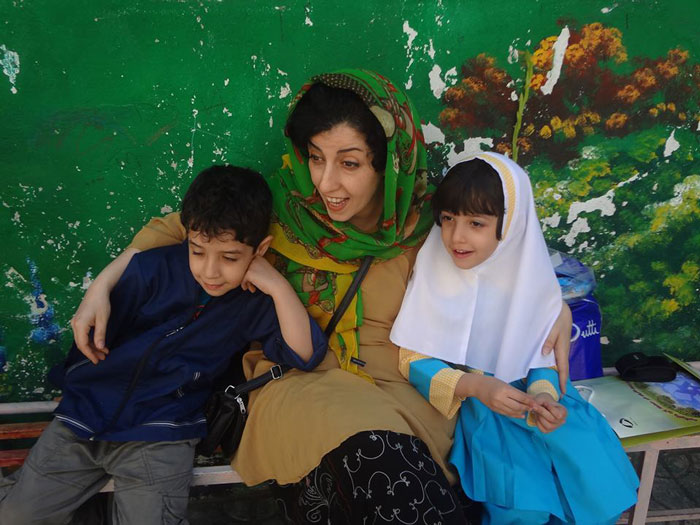Political Prisoner Narges Mohammadi’s Sister Banned From Travel as State Continues to Harass Her Family

From her cell in an infamous Iranian prison, imprisoned human rights activist Narges Mohammadi has condemned Iran’s judiciary for preventing her sister from traveling to France to visit her children who she has not seen for three years.
In a letter from Evin Prison in Tehran to Judiciary Chief Sadegh Larijani, the prominent human rights defender warned that she would take “protest action” if the ban on her sister was not lifted.
“The imposition of pressures, the domination over defenseless families of political prisoners even during visitation, are not only motivated by political and security considerations but also show a deterioration of morality and human dignity,” wrote Mohammadi.
The Center for Human Rights in Iran (CHRI), the UN and other human rights organizations have documented many instances of Iran’s security forces, particularly the Islamic Revolutionary Guard Corps (IRGC), harassing the relatives of Iranian journalists living abroad to intimidate foreign-based reporters and silence critical media coverage of the Islamic Republic.
Published by the Iranian Defenders of Human Rights Center on July 17, 2018, the letter pointed out that the travel ban is the latest among other recent forms of state-perpetuated harassment targeting her and her family, including the interrogation of Mohammadi’s father, lack of proper medical care in prison, and the denial of furlough.
Furlough, temporary leave typically granted to prisoners in Iran for a variety of familial, holiday, and medical reasons, is routinely denied to political prisoners as a form of additional punishment.
In her letter Mohammadi explained that her sister, whose name was not provided, was prevented from leaving Iran in July 2018 to visit Narges’s children—daughter Kiana and son Ali—who have been living with their father, Taghi Rahmani, in France since 2015 after their mother was imprisoned.
“I have been informed that a security agency belonging to the judiciary prevented my sister from traveling to France to visit my young children who left the country three years ago and have been denied seeing their mother,” wrote Mohammadi. “They were waiting to see my sister for a long time.”
She added: “As if it is not enough that your subservient judges have issued heavy sentences against a woman to imprison her for 16 years, separated her from her young children, incarcerated her without furlough, denied her medical treatment despite the doctor’s order for hospitalization to undergo an urgent operation, now you have taken cruelty and intimidation further by interrogating my ailing elderly father… in order to nail injustice into my bone. But of course, I will still not give up.”
On June 30, 2018, Mohammadi was hospitalized due to severe kidney pain and underwent tests for gallbladder and kidney stones. She was returned to prison after a few days.
Political prisoners in Iran, including elderly inmates, are singled out for harsh treatment, which often includes denial of medical care. The threat of withheld medical care has also been used as an intimidation tool against prisoners who have challenged the authorities or filed complaints.
Mohammadi, who was awarded the Per Anger Prize for her defense of human rights in Iran in 2011, was first arrested in 2009 and sentenced to 11 years in prison for the charges of “assembly and collusion against national security,” “membership in the Defenders of Human Rights Center,” and “propaganda against the state.”
Upon appeal, her sentence was reduced to six years behind bars and she was released from Zanjan Prison in 2013 on medical grounds.
She was arrested again on May 5, 2015, two weeks after meeting with Catherine Ashton, the European Union’s foreign policy chief at the time, at the Austrian Embassy in Tehran.
In September 2016, Branch 26 of the Tehran Appeals Court upheld a 16-year prison sentence against Mohammadi for the charges of, “membership in the [now banned] Defenders of Human Rights Center,” “assembly and collusion against national security,” and one year for “propaganda against the state.”
Mohammadi will be eligible for release after serving 10 years.






